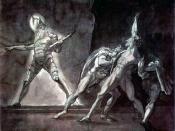Hamlet's ability to sense the hidden corruption in Denmark shows that he is not mad but perceptive. Discuss.
Hamlet was always weary of the possibility and then the reality of corruption in the palace. From the first scene when the apparition appears the audience is aware that it is real as it is confirmed by Marcellus. In the sense of this statement, this is the foundation of the play. It illustrates that Hamlet isn't seeing things when he is still grieving his father's mysterious death. The audience has no choice really, but to believe what Hamlet questions and states for the remainder of the play. Hamlet is not mad but has an almost daunting self-belief, which is so intense that the majority of the palace assumes he is mad. His desire to uncover the truth is so strong that he is not afraid to lose friends, partners or family by whatever means he considers are necessary.
It is reasonable to say that this was a unique grieving process experienced by Hamlet. He obviously loved and looked up to his father, who died far to early and oddly for questions not to be asked. Hamlet took it upon himself to ask those questions. To describe his actions as mad are inaccurate and not fair on Hamlet. He was shattered by the tragic death of his father and desperate for the actual events of the death.
Hamlets perceptiveness is illustrated at the beginning of the play when what appears to be the ghost of his father appears. He is not afraid and orders the guards on duty to let him follow the ghost. The ghost requests revenge against the 'Most seeming virtuous queen' and 'That adulterate beat'. Obviously referring to Claudius and Gertrude. Hamlet embraces the ghost and its request gives him a purpose of life, something to achieve. Hamlet cannot be mad, as two other bodies have seen the ghost to. This apparition convinces the audience and Hamlet himself that corruption is present in Denmark as it was a historic superstition that ghosts would return from the dead to give some kind of warning to the living. Hamlet is not sensing corruption; it is almost blatantly obvious with appearance of the ghost. Horatio as seen it, Marcellus has seen it and Bernardo has seen it. However Hamlet has heard it. Hamlet is almost given the challenge of locating he epicentre of the corruption, although it is made fairly clear from the ghost. Many believe that because only Hamlet heard the ghost speak that it could be a fabrication of his imagination or self-invention, but as mentioned earlier it is an age-old belief that ghosts only appear to warn the living. Horatio is the first to mention this, so regardless of whether Hamlet heard the ghost or not, it still indicates corruption in Denmark and that Hamlet isn't mad. He is perceptive because he understands why his father has returned. The apparition only spoke to Hamlet because he is the only member of the family to believe that his father's death wasn't natural.
If Hamlet were truly mad he would have no trouble in killing Claudius on the grounds of what the apparition explained to him. However this is not the case. He is spasmodic and dubious, attempting to convince himself to do it but then quickly finding holes in his own shallow plans backs out. These are the actions of a sane man that has just been presented with an immorally moral task. Finally in act 2 scene 2 he decides to gather more evidence in order to truly be certain of Claudius's guilt. He deciphers an intelligent plan directed at releasing the true emotion and guilt of Claudius. His plan is to present Claudius and Gertrude with a play that is blatantly subliminal about the death of his father. The public watching are meant to enjoy it however Claudius and Gertrude are meant to be uncomfortable and squirm, thus essentially proving their guilt. Mad? It appears not. This plan is cunning and it would be hard for anyone put in a situation like that to remain level headed and emotionless. If he were truly mad he would have acted on what the ghost almost immediately. He is not weak emotionally or physically and is wary that the ghost could be evil. Proceeding with this plan will quell his worries about the ghost being evil and convince him of Claudius's and Gertrude's guilt. The play scarcely starts before the unease of Gertrude and Claudius are identified and not long after that Claudius get up to leave after a scene in the play in which the king was poisoned. Hamlet and Horatio are now convinced and Claudius is aware that his secret is probably known.
Polonius, Ophelia, Gertrude and Claudius constantly refer to hamlet as 'mad', but it is them that are really in the wrong. Hamlet is grieving his father's death and seeking revenge, but he is weary that the ghost could be evil. He has the peace of mind to be certain. Hamlet is constantly presented with fixed situations and when he acts accordingly he is assumed to be crazy. This is shown when Polonius is worried that Hamlet is crazy in love with Ophelia so he sets up a meeting between the two in which Claudius and Polonius will watch. Hamlet is immediately conscious of the strange situation and mindful that there could be other listeners. He uses it as an opportunity to unleash his true feelings of his mother's quick re marriage. Ophelia is now convinced of Hamlets so called 'madness' as well, but what exactly is this based on? This situation is thrust upon Hamlet who is straight away aware of its obscurities. Unsatisfied with the result Polonius is again scheming a plan to prove Hamlets 'madness'. Polonius decides he will hide behind the large curtains in Gertrude's room and listen to a pre-planned conversation between the Queen and Prince. Hamlet again speaks his mind and Gertrude is surprised and alarmed requesting help. Polonius attempts to answer the premature call but gets killed by Hamlet in the process, who believes it is Claudius. Hamlet continues to tell Gertrude how he feels and when he leaves Gertrude is almost hysterical speaking of Hamlets blatant madness. However is Gertrude convinced of her sons madness or just aware that he is slowly uncovering the true story. The King and Queen are so convinced that they have done nothing wrong that they believe Hamlet is in the wrong. Polonius brought his death on himself, as did Claudius and ultimately Gertrude by the end. Laertes has a right to seek vengeance similar to Hamlet, however his father was not a victim like King Hamlet. Hamlet was anything but mad, he was just unaware of how to truly release his feelings. The people around him were so mad that they weren't even award of it.
Hamlets perceptiveness is so acute he is able to seduce the guilt from the King and Queen. He is constantly provoked by the King and Queen who unsuccessfully try and manipulate him by placing him in pre conceived scenarios. By expressing his true emotions he is assumed to be crazy when he is understandably still coming to terms with he's father's death and then the appearance of his ghost. Gertrude doesn't seem to understand that she broke Hamlets heart by remarrying within 2 months of the death. It seems almost ridiculous and widely inaccurate to call Hamlet crazy, he is merely suspicious and concerned for his family.





